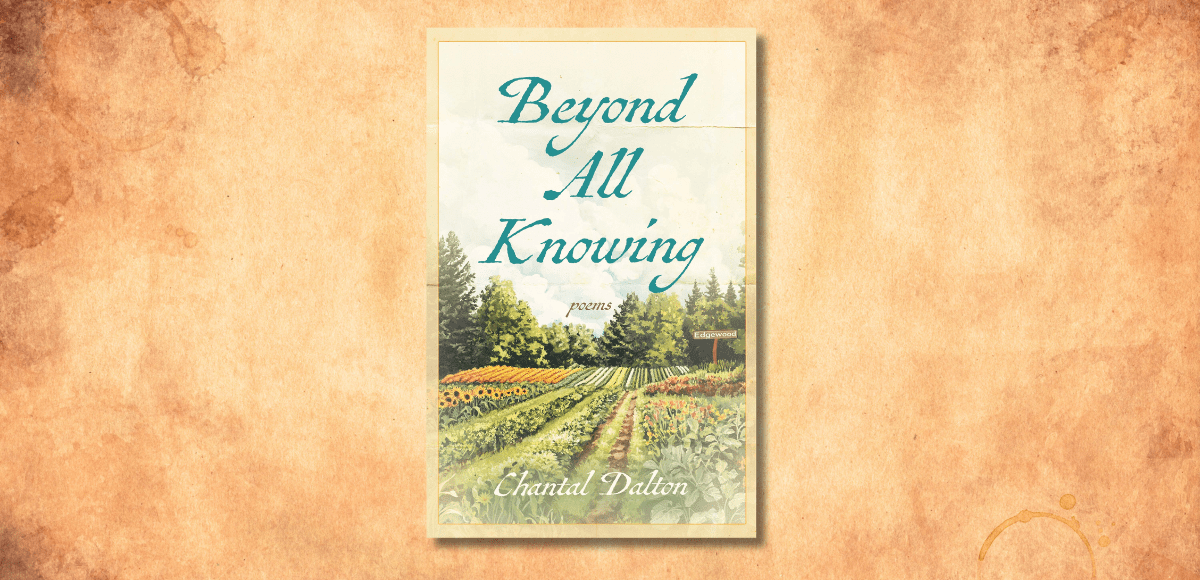
Beyond All Knowing
by Chantal Dalton
Genre: Poetry
ISBN: 9798891327184
Print Length: 102 pages
Publisher: Atmosphere Press
Reviewed by Nikolas Mavreas
A wise and weary contemplation of untenable love
In Beyond All Knowing, Chantal Dalton writes about love, age, companionship, and loss. Her medium is the exploration of a relationship between a young man and a much older woman, from whose perspective these poems are written. Dalton’s exploration yields results that are filled with gracefulness as well as wisdom.
It would be inaccurate to the collection to analyze this book poem by poem. It is characterized by a complete unity of setting and narrative, if not of theme. Maybe it is not even a collection at all, but, rather, a uniform work of poetry, with the poems’ names serving as useful section dividers and indicators of meaning. This a story—and a powerful one at that—a stroboscopic look into an obviously complex situation.
A woman, incontinent and equipped with titanium knees, is in love with a young man, who travels and may tend to get drunk on tequila. There is a platonic relationship and a great deal of affection between the two, but it is not clear that feelings are exactly reciprocal, there being a difference between love in the forms of eros and agape. And so, the book is an extended rumination on unfulfilled love, seen from a quite unusual point of view, that of the older speaker who is here seen wondering about the fate of her tributes to the young man:
“Are my poems your haven and refuge? Or just writing that disappears on a frosty window under a ruthless sun?”
The lines oscillate between companionship and loneliness, often juxtaposing the two, with loneliness largely prevailing. The poet-protagonist goes through extremes of emotion, though their expression is fittingly subtle and subdued. She is a remarkably wise woman. Like the Marschallin in Rosenkavalier, she movingly and poignantly meditates on the unfairness of time and untimeliness. “Our timelines don’t match,” she puts it crudely, “but our spirits do.” Would she have preferred it if their timelines matched? Evidently so, and she poetically says so through artful denial:
“Good thing I didn’t meet you or know you sooner, I wouldn’t be sitting here longing to hear you whisper instead of shout — Longing to make you sigh.”
Dalton’s authentic poetic sensibility is apparent throughout. She has a knack for rhythm, but she doesn’t always take full advantage of it. The texture of her writing is delicate, yet unstrained in its simplicity. She arrests us with her insights into the psyche. These, presented without decoration, can be quite grim, nowhere more so than when the protagonist sees herself: “wrinkly skin, hesitance and fading purpose.” Such flashes disrupt the natural idleness of the work like far-off thunderbolts sounding on a simply cloudy day.
Like with everything else in life that is dictated by time, acceptance is the only possible route in our speaker’s situation. Our heart, however, can’t help but break at the reluctance, achingly simmering under the surface of her words, to accept inevitability and loss. Beyond All Knowing is filled with affecting bits of reality and stirring emotion. There is great knowledge here—and even greater lessons.
Thank you for reading Nikolas Mavreas’s book review of Beyond All Knowing by Chantal Dalton! If you liked what you read, please spend some more time with us at the links below.


0 comments on “Book Review: Beyond All Knowing”